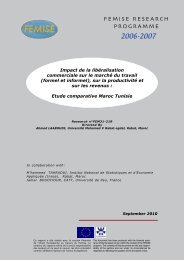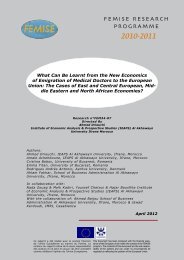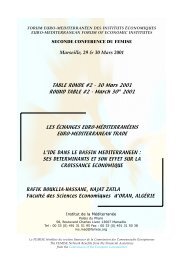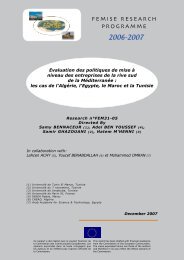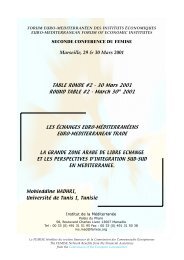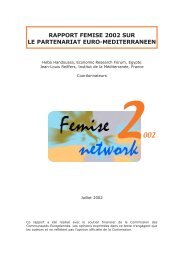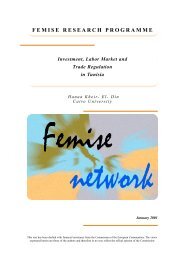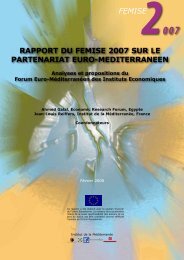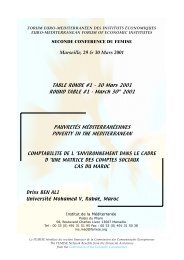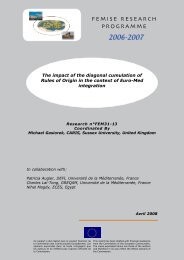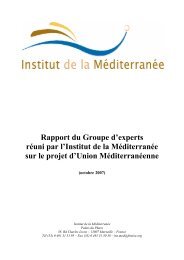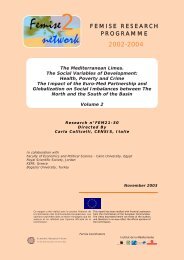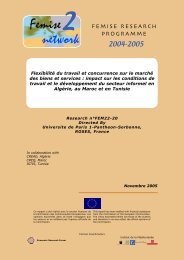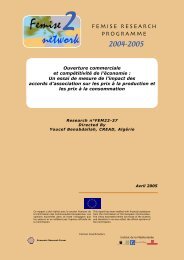Télécharger/Download (PDF, 298 p, 1,64 Mo) - Femise
Télécharger/Download (PDF, 298 p, 1,64 Mo) - Femise
Télécharger/Download (PDF, 298 p, 1,64 Mo) - Femise
Create successful ePaper yourself
Turn your PDF publications into a flip-book with our unique Google optimized e-Paper software.
guilt and promised that they would never do it again. They were ordered to pull themselves together<br />
and stop this mispractice. But they became even worse within a very short time. Despite many<br />
subsequent warnings, they continued violating the law and religion’s orders.<br />
Then were gathered all bakers and assessors together and questions were addressed to them<br />
regarding the previous prices, they replied that the bread was for as long as they could remember<br />
around hundred and fifty dirhams less than the necessary weight, but the flour was made from<br />
quality wheat and passed through a fine-mesh sieve, a sufficient amount of poppy seeds was<br />
sprinkled on the loaves that were baked crisp. They also said that one oke of fat to be added to one<br />
kile of flour, but it was nowadays reduced to half an oke. The loaves presently baked were of<br />
different and often lower qualities. The inquiries showed that the reason of this worsening was the<br />
habit of giving and receiving bribes and the resulting lack of control.<br />
Standard for the buns:<br />
The buns should be one-half the weight of a bread loaf and one oke of fat should be added to one<br />
kile of flour. The inspection revealed a low quality due to bribing again. Bakers were told to revert<br />
to the original standards.<br />
Onions:<br />
The onions which were sold at one akça for four and a half oke are now on sale at four oke at the<br />
same price. Onions with stems weighed five okes, which were reduced by half an oke in the<br />
autumn. Green grocers were making two-oke bundles from the two and a half oke winter deliveries.<br />
This practice also was against the law because of the akças inobtrusively slid into the pockets of<br />
controllers. Merchants were told in no uncertain terms to return to the previous rules.<br />
Butchers:<br />
When the butchers, assessors and city fathers were brought together and asked, most of the true<br />
believers said that the price of mutton had three different levels at three different annual periods:<br />
The unit was two hundred and fifty, three hundred and two hundred dirhams in each of the fourmonth<br />
slices of the year. They added that three hundred dirham was wholly forgotten for the past<br />
four or five years. Replying the question of why three hundred dirhams were not being used any<br />
longer; butchers showed several reasons: Primo, there was a freightage tax of one akça per sheep at<br />
Gallipoli pier in the past, which is now raised to four akças. Secundo, the imperial almshouses and<br />
some dignitaries collect from us sixty thousand sheep on foot per annum and the latter has been an<br />
official levy today. Tertio, they had received a court decision to the effect that the unit will be three<br />
hundred dirhams in Bursa when it is three hundred and fifty in Istanbul and always fifty dirhams<br />
less than it will be in Istanbul. Yet said the believers that the pier tax was raised some fifteen years<br />
ago while the abandonment of three hundred dirham unit took place only four or five years ago and<br />
gift of sixty thousand sheep to almshouses is no longer valid although the state levy continues and<br />
this did not cause any lessening of live sheep deliveries to the city. Now, varying numbers of sheep<br />
is sent to Bursa and price is determined by the quantity of available animals. Sometimes, more<br />
sheep comes here than to Istanbul and butchers did not raise the unit weight to three hundred<br />
dirhams when it was three hundred and fifty in Istanbul. The butchers were accused by the inquirers<br />
that they had entered into a clandestine agreement with the mayor, to whom they had paid large<br />
amounts of money at the beginning of the season and sold the mutton at the unit weight of two<br />
hundred and fifty when it should have been three hundred and thereby disregarded and denied the<br />
tenet of intermoslem solidarity. It was ascertained that the real culprit in this was the mayor. The<br />
city fathers intervened at this point and laid bare another bitter fact that continued for the past four<br />
or five years. The goat flesh always sold at a unit weight fifty dirhams more than the mutton; but<br />
the mayor collected two akças for each goat slaughtered and permitted it to be sold at the mutton<br />
price. Around one hundred city fathers as true believers swore before the mayor and his aides that<br />
they had actually witnessed the money changing hands between the mayor and butchers. The latter<br />
did not deny it and said that they had no compuction to sell the goat flesh at the same price as<br />
mutton. Many butchers clearly confessed this in front of the people in the meeting.<br />
Marketplace vendors:<br />
CIHEAM-IAMM<br />
Juin 2005<br />
267



